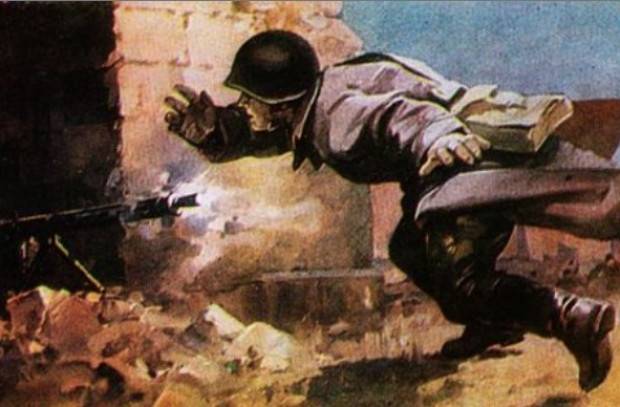Russian warrior Nikolai Gribanov: died while being liberated from the Baltic fascists

October 16 1944 of the year, shutting down the enemy machine gun, died the death of the brave junior sergeant Nikolai Gribanov
In the summer-autumn campaign of 1944, the Red Army troops conducted a series of major operations, during which Belarus, Ukraine, Moldova and part of the Baltic states were liberated.
For the final liberation of the Baltic states, the Soviet command prepared a plan, later called the Eighth Stalinist strike.
The Balts: Latvians, Lithuanians, and Estonians, despite their cultural affinity with the German people, were considered by the Germans to be a second-rate and inferior ethnos. In the program of the future Germany (plan “Ost”) they were prepared for the same fate as the rest of the non-Germanic peoples. The Baltic states were considered by the Germans exclusively as a raw material appendage and a strategically important region, having access to the eastern part of the Baltic Sea.
Therefore, for the German command, it was important to retain these territories to protect East Prussia. For the Soviet command it was equally important to return them, for two centuries, with the exception of a small period, these territories were part of the Russian Empire first and later the USSR. In the Baltic operation, about 900 thousands of Red Army soldiers were involved.
For Nikolai Gribanov, the August battles for the liberation of the Baltic states became a baptism of fire, the 19-year-old youth, a native of Saratov land, was drafted into the army in 1943 year. Prior to that, he worked as a mechanic on the steamer "Narym" of the Volga River Shipping Company, and having entered military service, very soon proved himself to be a brave and brave soldier.
In August, 1944 was the first to force the Memel River and, destroying an enemy machine gunner and five submachine gunners, prepared a bridgehead for the remaining fighters to cross. A month later, Gribanov distinguished himself during the liberation of the Latvian city of Bauska, standing on the Memel River. Nikolai Gribanov was again the first to cross the river, which showed an example to the other soldiers.
The authors of the military-historical essay “Liberation of Soviet Latvia” report that Gribanov, together with four fighters, getting close to the command post of the enemy battalion, engaged in battle with the Nazis, which were more than thirty. Four Red Army men died, Gribanov continued firing at the Nazis alone. Soon, the 4 Company fighters came to his aid and did not let the enemy leave.
In this battle, Gribanov replaced the commander who died during the crossing over Memel, after this battle Nikolai Vasilyevich was given the rank of sergeant, and he was awarded the Order of Glory of the 3 degree.
When Gribanov was awarded, he said: “I will destroy the enemies, while I have strength in my hands, while my heart beats!”
In the beginning of the 5 of October of the 1944 of the Memel operation, the 423 th rifle regiment was involved, the 166 th rifle division of the 1 Baltic Front, whose commander was Gribanov. He distinguished himself during the capture of the village of Gorki, destroying five fascists in battle.
Our troops were steadily moving forward, in the battles near the village of Vainode (now Liepaja region of Latvia), the company of Gribanov, having occupied the first trench of the enemy, was unable to advance further because of the heavy fire of the enemy machine gun.
Red Army soldiers suffered losses, attempts to suppress the firing point with grenades did not bring success. When the grenades were over, the squad leader made decisions at the cost of his own life to close the machine gun. With an exclamation "Forward, for the Soviet Motherland!" Nikolai Vasilyevich rushed to the machine gun and closed it with his body. He repeated the feat of Alexander Matrosov and at the cost of his own life saved the lives of his colleagues. The junior sergeant Nikolai Gubanov was only 19 years old. He was posthumously awarded the title Hero of the Soviet Union.
In a letter to the hero's mother, Khavronye Petrovna, Lieutenant Fedulov, on behalf of all his fellow soldiers, swore to avenge the death of his comrade:
“At his grave we swore to avenge his death, and we will fulfill this oath ...”
With the liberation of the Baltic states from the fascists, about half a million Soviet soldiers and officers died.
Information